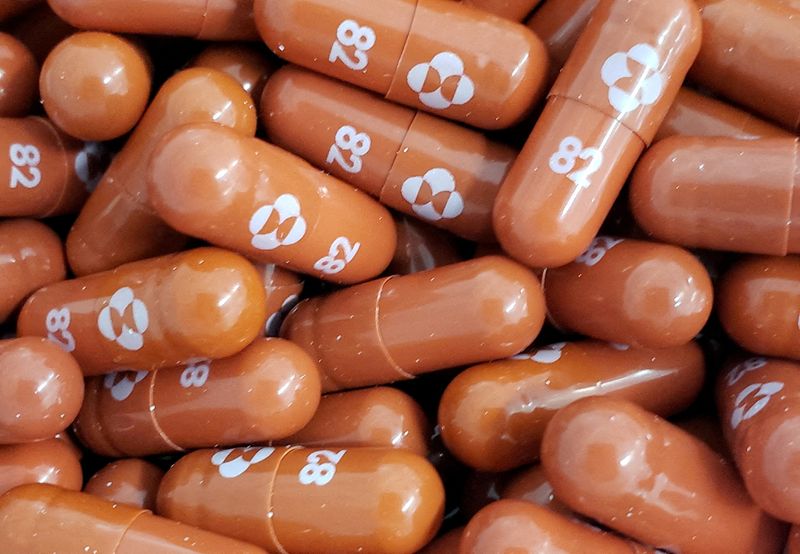By Deena Beasley
(Reuters) - Rival antiviral pills from Pfizer Inc (NYSE:PFE) and Merck & Co that demonstrated efficacy in trials of adults with COVID-19 who are at high risk of serious illness are now both in use. The drugs are being studied to see if they can prevent infection in people exposed to the virus.
Here is an explanation of the differences in the two pills.
Which of the new pills works better?
Trial data provided by the two companies suggest that Pfizer has the more effective pill.
Pfizer in December said final trial results showed that its treatment reduced the chance of hospitalization or death by 89% in COVID-19 patients at risk of severe illness given the treatment within three days of the onset of symptoms, and by 88% when given within five days of onset.
Merck in November said its full trial results showed that molnupiravir lowered the chance of hospitalization or death by about 30% in patients at risk of severe COVID who were given the treatment within five days of developing symptoms.
An earlier, interim look at Merck's trial on Oct. 1 had suggested that molnupiravir halved the risk of hospitalization or death. Merck did not provide figures regarding patients getting the pill within three days of onset.
Pfizer's two-drug regimen is being sold under the brand name Paxlovid. Merck's drug has the brand name Lagevrio.
Why are these drugs important?
While a number of vaccines are available worldwide to help prevent infection and serious illness, including one made by Pfizer, there are limited treatment options for people infected with COVID-19.
Currently, COVID-19 patients who are not sick enough to be hospitalized but are at risk of serious illness can be treated with antibody drugs, though they have to be given intravenously at hospitals or infusion centers.
Antibodies developed early in the pandemic have not held up against the now dominant Omicron coronavirus variant. Sotrovimab, from GlaxoSmithKline (NYSE:GSK) and Vir Biotechnology (NASDAQ:VIR), which in trials reduced the risk of hospitalization and death by 85%, has shown to be effective against the highly-transmissable variant.
Gilead Sciences Inc (NASDAQ:GILD)'s intravenous antiviral drug remdesivir, sold as Veklury, was recently given emergency approval by U.S. regulators as a three-day infusion for at-risk COVID patients after it was shown to reduce their risk of hospitalization by 87%.
How do they work?
Both oral regimens are given for five days. Pfizer's regimen is three pills in the morning and three pills at night. Merck's drug is taken as four pills in the morning and four at night.
Pfizer's drug is part of a class known as protease inhibitors designed to block an enzyme that the coronavirus needs to multiply. It is given in combination with ritonavir, an older antiviral that boosts the activity of protease inhibitors but can cause gastrointestinal side effects and interfere with certain other medications.
Merck's pill, developed with Ridgeback Biotherapeutics, is a nucleoside analogue with a mechanism of action that aims to introduce errors into the genetic code of the virus.
Both companies have said laboratory studies show that their pills are active against coronavirus infections caused by the Omicron variant.
What do we know about safety?
Both companies have released only limited data on the treatments, but expressed confidence in their safety.
Pfizer said about 20% of patients who received either the pill or a placebo in trials experienced adverse events, mostly mild. Serious side effects were reported by 1.7% of patients receiving the drug and 6.6% of placebo patients.
Since the ritonavir component of Paxlovid can interfere with other medications, physicians emphasize that patients need to share an accurate list of any other drugs they are taking before being prescribed the Pfizer drug.
Merck said 12% of patients receiving its drug and 11% of placebo patients experienced drug-related adverse events.
Drugs in the same class as Merck's pill have been linked to birth defects in animal studies. Merck has said similar studies of molnupiravir - for longer and at higher doses than used in humans - show that it does not cause birth defects or cancer.
Molnupiravir is not authorized for U.S. patients younger than 18 years of age because it could affect bone and cartilage growth. It is also not recommended for use during pregnancy.
The U.S. Food and Drug Administration advises that both men and women of child-bearing age be on reliable birth control while taking the Merck drug, and that it cannot be used by pregnant women.
What do we know about supplies?
Pfizer and Merck have said they are making efforts to expand global access to the drugs, including allowing generic drugmakers to sell lower-cost versions in low-income countries.
Pfizer has said it expects to have capacity to produce up to 120 million courses of its therapy this year.
Merck has said it could produce at least 20 million courses of its drug this year.
Which costs more?
The U.S. government provides vaccines and treatments for COVID-19 for free to U.S. residents. Countries around the world are negotiating prices with Pfizer and Merck.
The United States is paying around $530 for each course of Paxlovid and $700 for each course of molnupiravir.
